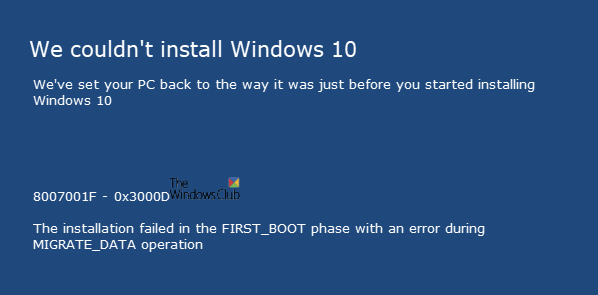When upgrading, if the Windows Setup fails with Error Code 8007001F – 0x3000D, then technically, it means that there is a problem with the user profile migration on the computer. The exact cause in technical terms is:
The installation failed in the FIRST_BOOT phase with an error during MIGRATE_DATA operation.
During installation, Windows goes through multiple phases during boot up, and this failure happens in the first boot phase.

Windows Upgrade Error Code 8007001F – 0x3000D
If you know how to analyze log files, you need to determine the files or Registry entries that are blocking data migration. Usually, this error occurs when there is a problem with user profiles. Registry corruption can make Profile user entries invalid.
In short, you need to figure out User Profiles that are either duplicate or should not have been there. At times when a previous upgrade did not finish, invalid profiles might exist in the Windows.old\Users directory. You should delete accounts or related entries from the Registry.
These specific files and profiles casing the error will be listed in the Windows Setup Log files. Look for “setuperr.text” file in C:\Windows. Open, and look for mention of user profiles. The log messages are in this format:
Date/Time : 2016-09-08 09:23:50
Log level: Warning MIG
Component Message : Could not replace object C:\Users\name\Cookies. Target Object cannot be removed.
Make sure to create a system restore point before deleting files. In case something goes wrong, you have a way to restore it to a working condition.
Delete Invalid Users from Registry
Type regedit in the Run prompt, and hit enter.
Navigate to:
HKLM\SOFTWARE\Microsoft\Windows NT\CurrentVersion\ProfileList
Find out the list of profiles that are invalid.
Delete it.
Delete Invalid User Folders
- Go to the drive where Windows is installed. (Assuming C here)
- Navigate to C:\Users and find invalid profiles that should not have been here.
- Delete it and empty the Recycle Bin as well.
This method should resolve the Error Code 8007001F – 0x3000D. Let us know if this worked for you.
How do I Fix any Windows Upgrade Error?
At times, Windows Upgrade is known to create problems as well. It’s primarily because of the compatibility between devices and updates, or there can be minor issues. That said, if you get an upgrade error before the updates start, you can run the Windows Troubleshooter, clear the files from the software distribution folder, and try updating again. If you are facing issues after the upgrade, the only way out is to check if there are fix released for the issue, or you can always roll back to the previous version in 10 days.
What is the difference between Windows Upgrade and Windows Update?
While they sound similar, they are unique. Windows Upgrade occurs when there is a significant change in the OS, while the update is when Windows Team rolls out fixes to the platform reported by users. Windows 10 has substantial feature updates, but Windows 11 is an Upgrade. Another criterion during the upgrade is a change in hardware requirement. Windows 11 needed TPM 2.0 to upgrade PCs from Windows 10; if you did not have one, the only way out was to buy new hardware.
Related errors:
- The installation failed in the FIRST_BOOT phase with an error during SYSPREP operation
- The installation failed in the FIRST_BOOT phase Error 0x800707E7 – 0x3000D
- The installation failed in the FIRST_BOOT phase with an error during BEGIN_FIRST_BOOT operation
- The installation failed with an error during MIGRATE_DATA operation, Error Code 0x80070004 – 0x3000D.
without a lot more detail on what is valid/invalid, this advise is pretty dangerous….
“Find out the list of profiles which are invalid.” need a comprehensive how-to.